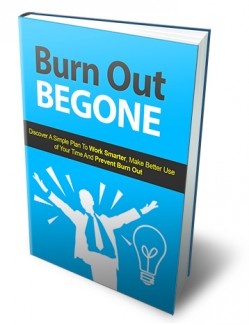 License Type: Giveaway Rights
License Type: Giveaway Rights  File Size: 4,183 KB
File Size: 4,183 KB File Type: ZIP
File Type: ZIP
 SKU: 54320
SKU: 54320  Shipping: Online Download
Shipping: Online Download
Ebook Sample Content Preview:
Decision Fatigue
Don't underestimate the amount of mental energy required to make even small decisions. While it might not seem like a big deal, deciding what to have for breakfast, what to wear and where to go for dinner all take a toll on your energy levels. Making these small decisions can deplete your reserves and can end up having a cumulative effect that contributes to burnout. This is actually the reason that Steve Jobs famously wore the same black top and jeans every single day - so that he could eliminate the tiring process of having to choose what to wear. You don't have to go that far but having a consistent breakfast will make life considerably easier.
Make Sacrifices
Some things can't be outsourced or automated and in these cases you might just need to make sacrifices. This is especially true if you want to start fitting something else into your schedule.
If you're planning on working out 5 hours a week consistently on top of your already hectic schedule for instance, then you're likely to find that it just doesn't work. Instead, you need to make sure that you give up something else you do regularly in order to make the time necessary for the job.
An example of this would be to give up any clubs you do regularly that you don't absolutely need. Or alternatively you might just have to say no to the occasional invitation. While it's upsetting to turn down things you want to do - or that you feel you have to do - ultimately it's necessary sometimes. Remember, there's a limited amount you can do. You just can't do everything. That means you need to prioritize.
Habits and Lifestyle
A few small changes to your lifestyle and habits can also make a big difference by giving you less stress throughout your daily routine.
One example of this is to go more minimalist and to get rid of a lot of the stuff you don't need. Most of us have boxes and rubbish on top of our wardrobes and under our beds that we never look at. You might think those boxes are harmless but in fact their mere presence will be a slight stressor when you're trying to relax in that room, they will make it more difficult to find the things you're looking for and they will get in the way if you ever need to move.
If you haven't been in one of those boxes in the last 6 months, then chances are that you don't really need what's in them. So bite the bullet, be ruthless and throw them out. You'll be surprised by just how liberating this is.
Likewise, if you have lots of ornaments and clutter on your surfaces you should get rid of some of that. Doing so will mean you instantly improve the average quality of what's on display (because the stuff you leave will be the best stuff) and that cleaning and tidying is 100% easier.
Try to get into good habits that will pay off in the long run. Make your bed every single morning - it's one very small step but it makes a big difference to the look of your room and it's a great way to get yourself into a productive and efficient mindset.
You should also look into investing in simple gadgets and services that can make life better. Spend all morning ironing? Get a hand-held steamer. Got piles of dirty plates in the kitchen? Get a dishwasher. Waking up with low energy in winter? Get a daylight lamp from a manufacturer like Lumie and get woken up with a natural sunrise simulation every morning. Sometimes a small purchase can make a big difference.
In terms of your work life meanwhile, it might be suitable to try the favored approach of Tim Ferriss (author of The Four Hour Workweek) who recommends using the 80/20 principle to look at the 20% of activities that deliver the 80% of results. In other words, if you have 10 clients, there's a good chance that you get the vast majority of your work from 20% of them - and that the rest are just taking up a lot of your time without really paying off. The solution? Get rid of that 80% and focus on the 20% that are working for you. A lean business is more manageable and resilient and it results in a better work/life balance.
Learning to Relax
So you've made yourself some free time by cancelling plans, outsourcing things and removing a few minor decisions. This right away should make you feel a little bit better but unfortunately for many people it won't.
Why? Because although they might physically stop working and give themselves the time they need to relax, they nevertheless don't give themselves the mental break. If you're relaxing on the couch but you're ruminating and stressing about all the work you still have to do, then you are not getting the recharging break that you need. In fact it's worse in some ways because you won't have any physical tasks to distract you from your stress.
In order to properly recharge and to avoid adrenal fatigue you need to switch your mind off as well and you need to avoid additional sources of stressors.
If you crash in front of the TV on the couch, then you are not getting your batteries recharged. Instead, you're increasing cortisol levels due to the unnatural light from the TV, you're worsening aching joints by maintaining a bad posture and you're probably going to still be panicking and stressing about work while you stare at the moving images on the screen. Looking at your phone and texting is even worse. And texting while watching TV is pretty much an invitation for burnout.
A far better example of recharging your batteries would be to read a book. The reason for this is that when you read a book, you lose your inner monologue (because you're sounding out the words). This means you literally can't worry yourself by stressing about work and it means that you get to escape your reality for a bit. There will be less natural light, no sudden noises and you'll be able to relax much more fully. Drawing or painting is also particularly good.
Another thing you can do is to exercise. That might sound like the worst thing you can do to recharge your batteries but bear in mind that it's a mental break you're looking for, not necessarily a physical one.








